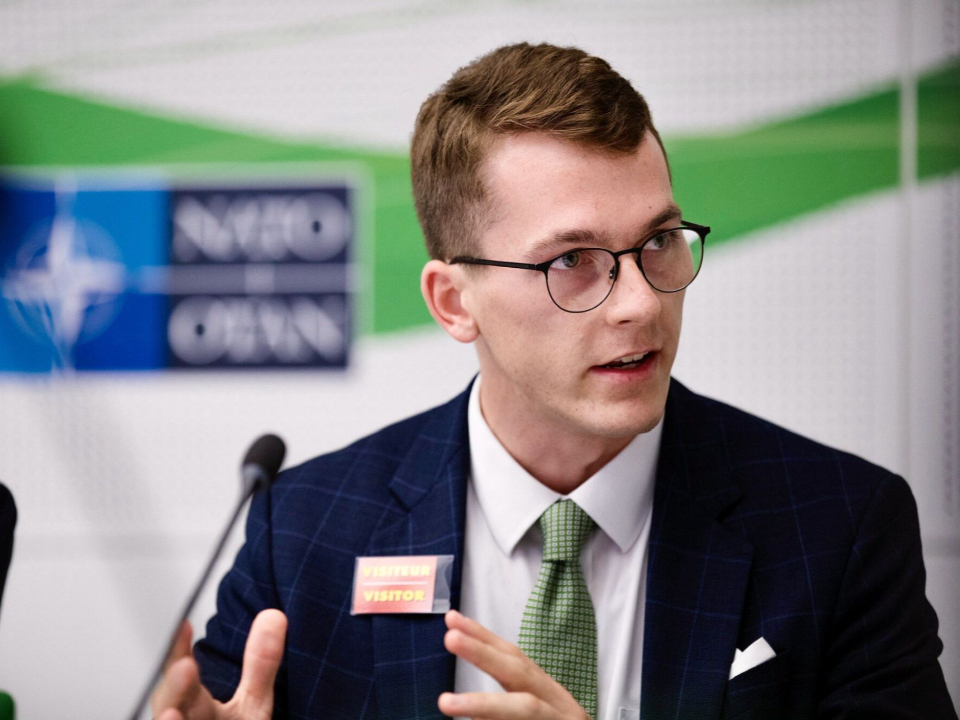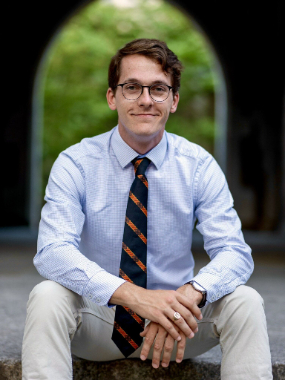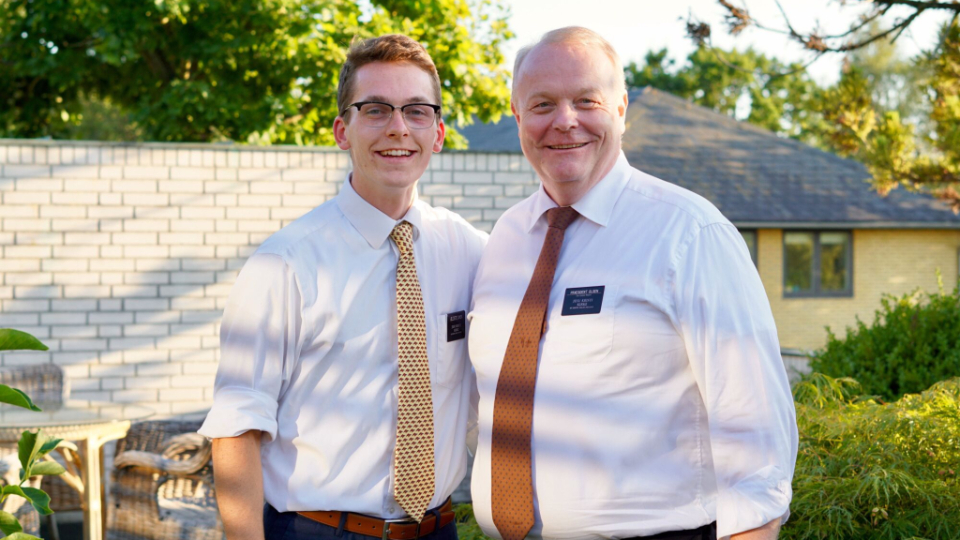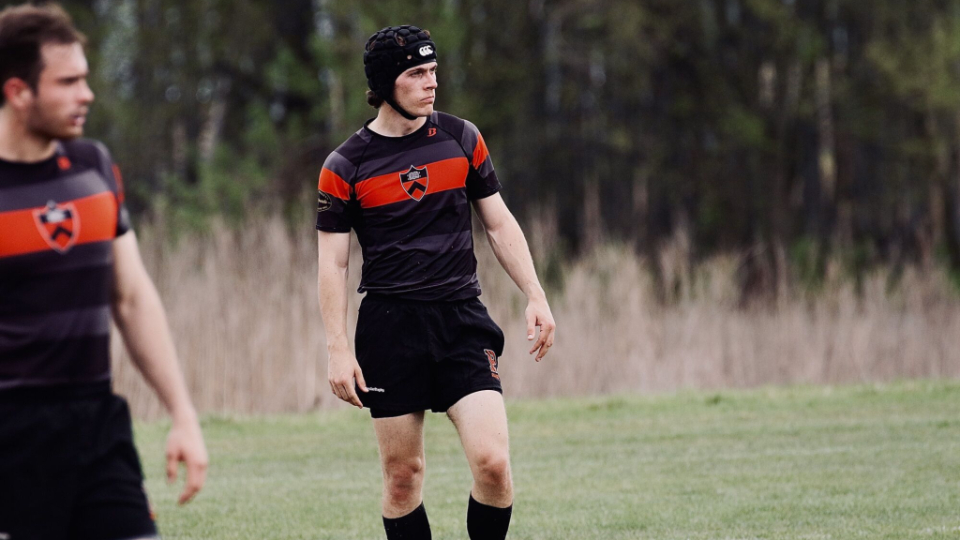
Riley-Owen
Riley Owen is photographed at NATO Headquarters in Brussels, Belgium, while meeting with various officials on a visit through the Liechtenstein Institute — a Princeton research group he helped lead. Photo provided by Riley Owen, courtesy of Church News.All rights reserved.This story appears here courtesy of TheChurchNews.com. It is not for use by other media.
By Valerie Walton, Church News
No matter which way one looks at Riley Owen’s life, it’s impossible to separate the influence of the Lord and the gospel from his many academic accomplishments in the field of public policy.

Riley-Owen
Riley Owen, a graduate of Princeton University, was named an Eisenhower Global Scholar and will be attending the University of Oxford to earn a master’s degree in public policy beginning fall of 2023. Photo by Rupert Peacock, courtesy of Church News.All rights reserved.In June, Owen was named one of four Eisenhower Global Scholars this year, awarding him a full scholarship to earn a master’s degree in public policy at Oxford University beginning this fall. This prestigious award is given by the Eisenhower Fellowships organization to American students working to make the world more peaceful, prosperous and just. It is offered only to students already accepted by the highly competitive Blavatnik School of Government at England’s University of Oxford or IE University in Madrid, Spain.
Owen recently graduated with a bachelor’s degree from Princeton University in international affairs. “I describe it as international politics,” he said. “I study how countries interact with each other, and how they can do so in a way that … can benefit our country, but also make the world a better, safer, more prosperous place.”
In contrast, the field of public policy, he explained, applies to both the domestic and international space.
“I think this is very much part of our gospel, to be involved in our society and the governments of our nation.” He cited the example of righteous judges in the Book of Mormon who were important to the people in the Americas at the time.
“I think for me, personally, spiritually, I’ve always felt a responsibility to give back to my community and our country. I feel so grateful to be an American and to have the gospel in my life, and I feel responsibility, because of all those blessings, to give back and to help make sure that other people can have access to those blessings.”
From Model U.N. to Mission
From a young age growing up in Los Angeles, California, Owen knew he wanted to be involved in the workings of the world’s politics.
“When I was a little kid, I would sit around Boy Scout campfires and say, ‘I want to be a diplomat one day,’” Owen said.
Little did he know then that his priests quorum adviser, Robert O’Brien, would work at the United Nations and become a national security adviser to the president of the United States — and that they would reconnect later.
“My son and Riley were in Scouts together,” O’Brien told the Church News. He noted that Owen had the distinction of earning more merit badges than anyone else. “He always did a little extra, a little more than anybody else.”
Getting involved in model U.N. — an academic simulation — when Owen was in sixth grade also helped inspire his interest in international and public policy. And serving in the Denmark Copenhagen Mission, he said, convinced him to focus his study on Nordic and Arctic security.
When Owen participated in two model U.N.s, he was assigned one year to represent Uganda, and then Denmark the next year.
Nearly a decade later, and in his freshman year studying public policy at Princeton, Owen was called to serve a mission in Denmark. “It was just funny having this model U.N. experience and then getting called to Denmark,” he said. “And the first man I met was a Ugandan man who had just been baptized, and we worked with him to help him go to the temple. I can’t call it a coincidence.”
Thanks to learning about both Denmark and Uganda back in sixth and seventh grades, Owen was uniquely qualified to relate to those he met. He could talk to this member from Uganda about the country’s capital, languages, tribes, certain dishes and food.
“It was almost like I was getting mission prep from sixth grade.”

Riley-Owen
Elder Riley Owen and Denmark Copenhagen Mission President Michael Olsen pose for a photo. Photo by Jared Walton, courtesy of Church News.All rights reserved.The recent convert from Uganda wasn’t the only refugee Owen met in Denmark. He taught people from over 50 countries. It “helped me to understand how to relate to so many different kinds of people, cultures, people from different backgrounds and to appreciate the differences that we have,” he said. “We are all sons and daughters of God, but we have different personalities and approaches and ways of thinking about things.”
Learning to appreciate and love people of various backgrounds has already proven helpful in his academic training and early stages of his career. For instance, the skills he used to talk about religion to Danish people are easily applied when returning to school. “Coming back to Princeton where it’s not BYU — there’s no honor code, there’s different values and it’s not a religious institution — I could explain these ideas to my peers in a way that was palatable and exciting to them.”
Studying at Princeton
While at Princeton, Owen was involved in the university’s Center for International Security Studies, leading strategy and crisis simulations on the Arctic and South China Sea and traveling to Pearl Harbor, Hawaii, and Italy to study military campaigns. Through his work as a student ambassador for the Liechtenstein Institute on Self-Determination, he met with government officials and industry leaders in Vienna, Austria; Brussels, Belgium; and Washington, D.C. He was also an undergraduate fellow in the James Madison Program.
In between all these commitments and travels, he also served as president of the Princeton Latter-day Saint Student Association and as president of the university’s rugby team for a year and a half.

Riley-Owen
Riley Owen served as captain of Princeton’s rugby team for a year and a half. Photo by Brent Nielsen, courtesy of Church News.All rights reserved.“Riley was a truly outstanding president of our Princeton University Rugby program,” Richard Lopacki, Princeton’s rugby coach, wrote in an email to the Church News. Owen “led the team with distinction while managing a very demanding schedule and maintaining extremely high academic standards within a challenging curriculum. … The best tribute I can make is that he will be leaving our rugby team better for having been its student leader.”
During the height of the COVID-19 pandemic, Owen worked on trade and manufacturing policy issues in the White House, especially in helping manufacture masks, gowns, ventilators and other equipment and get them to whoever needed them across the country or around the world. “It was rewarding working with industry leaders, helping to draft executive orders, to meet with other senior policymakers and to see how that works.”
One of his big takeaways was how much one person could do, even a “bottom-of-the-totem-pole” policy analyst. “It was impactful to see in certain situations how I can make a difference, either in changing the wording of something or presenting information a different way or having an idea and saying, ‘Why don’t we meet with this person?’ and ‘What if we did this?’”
Working at the White House also gave Owen the opportunity to work again with O’Brien, the mentor from his youth who was now the national security adviser.
O’Brien told the Church News that Owen “was born with a drive to do well and to be successful, and has a great family to help mold him.”
Owen’s success at Princeton and the added benefit of knowing how to speak Danish — an advantage since Denmark is a NATO ally — made him a stellar candidate for working in the White House, O’Brien told the Church News. Although the two didn’t work together day-to-day, O’Brien did have the opportunity to “hear about his progression and the good work he was doing from his supervisors. Everyone enjoyed working with him. …
“Obviously there’s something great about Riley,” O’Brien continued. “And it’s a wonderful thing for the Church that we’ve got a young man who’s got the credentials to receive [the Eisenhower Global Scholar] award. … I think Riley’s got a great opportunity to be a good example to his classmates and striving to be a great ambassador for the Church at Oxford. I also think it’s going to prepare him well for his future career.”
The Latter-Day Saint Experience at Princeton
Compared to other Ivy League schools such as Harvard, which has multiple young single adult wards, the Latter-day Saint community at Princeton seems minuscule by comparison. Owen’s branch consisted of about 30 members — half of them students, half from the surrounding community.
“It was great because it forms this community, this family, even though you’re not at a BYU-type religious institution,” Owen said. “You know who the other members are. We would get meals together all the time and have ‘Come, Follow Me’ on Sunday nights or just hang out. It was just this supportive group.”
Though he thought he would miss the stability of attending a ward, he came to appreciate the intimacy of serving in a branch. “As I served in different callings in the branch, I learned more about the gospel, more about myself and more about how to better love the people around me.”
Owen encourages Church members to at least apply to attend Ivy League schools. “I wish more members of the Church would apply to these schools, because there are so many smart and capable and ambitious members who can totally get into these schools.”
Princeton is “so supportive, not just of our Church, but all faith groups,” he said. “They really want to make it an inclusive space where we share and learn from each other.” He personally witnessed this inclusive attitude when Princeton made it surprisingly easy for him to defer his schooling for two years to serve a mission.
The other Ivy League schools are similarly encouraging of students practicing religious beliefs. “These universities are institutionally trying to make space for the expression of faith,” Owen said.
Onward to Oxford
Owen is eagerly looking forward to attending the University of Oxford in the fall. Earning his master’s degree from such a well established organization will “prepare me for being more engaged and qualified to serve in civil service or public service roles later in my life,” he said.
“My program brings together people from dozens of countries who have experience working in their governments and industries in their countries,” Owen said.
“I’m really excited to get to know people from around the world and hear their perspectives from trying to help their countries become more prosperous and safe and secure. That’s what I’m most excited for.”
Owen is quick to credit the gospel for shaping his life, sharing three ways it’s done so.
First, he knows that “truth exists, and seeking truth is important.” The gospel has “given me an anchor to my soul and helped me understand that the heavens are open, we can get revelation, and God wants to help us and guide us and be active in our lives.”
Second, the gospel “helps me to fulfill my potential.” Living by Heavenly Father’s principles has “given me the confidence and the courage to live with integrity and to seek and embody those truths. And in doing so, that protects me and helps me have a happier life,” he said.
Third, knowing that every person is a son or daughter of God helps him have more charity and Christlike love for everyone.
“In all these enriching experiences I’ve had for research and work and travel, I’ve been able to be at church in Ulaanbaatar, Mongolia; Tbilisi, Georgia; Stavanger, Norway; and Roskilde, Denmark; and it’s helped me see that the gospel applies to all these people and all these different cultures,” Owen said.
Values and cultures may vary all over the world, he added, but the gospel “applies to all of us, no matter where we live.”
Copyright 2023 Deseret News Publishing Company.